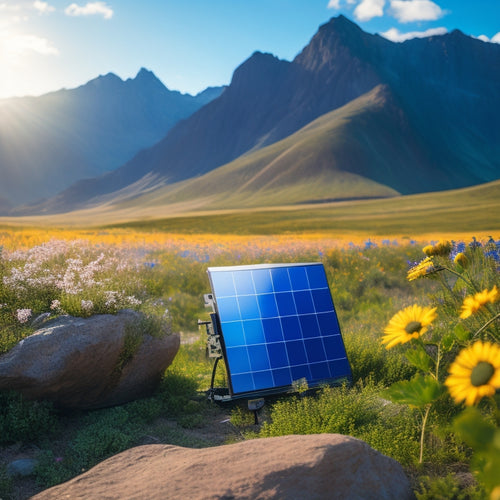
Rv Battery System
Share
When designing an RV battery system, you'll want to prioritize reliable power for off-grid escapades. A well-planned system enables extended camping trips, potentially up to several days, with an average daily energy requirement of 20-30 amp-hours. Lithium-ion battery technology provides efficient energy storage, and considering your daily power needs is essential. By choosing the right battery technology and management system, you can maximize your battery's depth of discharge, minimizing the need for frequent recharging. As you optimize your RV's energy system, you'll reveal the secrets to truly independent off-grid travel, and a deeper understanding of your energy needs will unveil more opportunities for freedom on the open road.
The Essentials
- A well-designed RV battery system involves selecting the right battery type, inverter, and charging system to meet specific energy needs.
- Custom system design considers factors like energy efficiency, battery capacity, and power conversion to ensure reliable off-grid performance.
- Effective energy management involves monitoring usage, prioritizing essential devices, and adopting energy-saving practices to minimize waste and optimize power usage.
- Lithium-ion batteries are a popular choice for RVs due to their high energy density, reliability, and efficient energy storage capabilities.
- A battery management system (BMS) is crucial for safe and efficient operation of lithium-ion batteries, providing precision control and advanced monitoring features.
Reliable Power Off-Grid Adventures
You're seeking reliable power for your off-grid escapades, and you have multiple energy options to evaluate.
When powering remote excursions, you'll want to assess your energy needs and choose the right combination of solar, wind, or fuel-based generators to keep your RV battery system charged.
A deep cycle battery system, such as an RV lithium battery bank, can provide a reliable power source, but it's crucial to understand its limitations and pair it with a suitable charging solution.
Off-Grid Energy Options
Off the beaten path, where the grid's reach is limited, reliable power becomes a top priority for exploration-seekers. You need a sturdy off-grid energy system to fuel your journeys.
Solar panels and wind turbines are excellent options for capturing renewable resources, providing a sustainable means of generating power. Energy storage is essential; a high-capacity battery bank guarantees you have power when you need it. A reliable battery is the backbone of a self-sufficient lifestyle, and a high-performance battery for off-grid solar systems can alleviate concerns of inconsistent power supply and premature battery degradation Deep Cycle Power Storage.
Inverter systems convert stored energy into usable power, while power efficiency is key to minimizing energy waste.
When designing your off-grid energy system, consider your specific needs and the resources available. Assess your energy requirements, factoring in your RV's appliances, lighting, and other power-hungry components.
Then, select the right combination of solar panels, wind turbines, and energy storage to meet those needs. With a well-designed system, you'll enjoy energy independence, free from the constraints of the grid.
Alternative energy solutions offer a cleaner, more sustainable way to power your journeys, giving you the freedom to roam wherever, whenever.
Powering Remote Adventures
Venturing into the uncharted territories of remote lands often demands a reliable power source to fuel your escapades. As you commence on off-grid journeys, you need a system that can capture and manage power efficiently.
A well-designed RV battery system is essential to powering your remote excursions. When building your system, consider solar panel integration to tap into renewable energy sources off-grid camping journeys and minimize your reliance on noisy generators or depleted batteries. This not only reduces your environmental footprint but also helps you save on energy bills at campsites or RV parks.
Inverter selection is also significant, as it affects the efficiency of your energy conversion. Implement power monitoring to keep track of your energy usage and adjust your charging strategies accordingly. Regular battery maintenance is fundamental to guarantee your energy storage solutions remain ideal.
To minimize energy consumption, opt for energy-efficient appliances and invest in portable power stations for backup power. Off-grid communication is also essential, so consider investing in satellite devices or cellular signal amplifiers.
Extended Camping Trips Possible
You can power longer stays off-grid by selecting the right RV battery system, which allows you to conserve energy wisely.
This means you'll need to take into account your specific power requirements, including the type and number of appliances you'll be running, such as RV solar panel systems and camper solar kits that can help you stay powered off the grid.
Powering Longer Stays
A well-designed RV battery system is essential for powering longer stays, as it enables extended camping trips without the need for frequent recharging or reliance on external power sources.
With a reliable energy storage system, you can enjoy the freedom to camp off-grid without worrying about running out of power. Solar integration and portable chargers can supplement your energy needs, while inverter selection and charging techniques guarantee efficient energy conversion.
Regular battery maintenance and energy audits help optimize your system's performance. In case of emergencies, backup generators provide a reliable backup.
Power inverters and off-grid appliances complete the system, allowing you to live comfortably off the grid. By investing in a high-capacity energy storage system, you can power longer stays and enjoy the freedom to traverse without constraints.
With a well-designed RV battery system, you're free to roam wherever you please, whenever you want.
Conserving Energy Wisely
When setting up camp, powering down unnecessary appliances and lights is key to conserving energy wisely, allowing you to stretch your off-grid stays.
By being mindful of your energy usage, you can optimize your RV's battery system for extended camping trips.
To achieve energy efficiency, focus on load management by prioritizing essential appliances and devices.
Identify power-hungry items like air conditioning, electric water heaters, and high-wattage appliances, and limit their usage or replace them with energy-efficient alternatives.
Employ timers, switches, and smart plugs to control and monitor energy consumption.
Implementing energy-saving habits, such as using LED lighting, propane-powered refrigerators, and solar-powered charging, will greatly reduce your energy demands.
Lithium-Ion Battery Technology
You're likely familiar with the benefits of lithium-ion batteries, but it's crucial to understand the complexities of their design and management.
When it comes to off-grid power solutions, lithium-ion batteries are a popular choice due to their reliability and efficient energy storage.
Lithium-ion cells, for instance, are typically arranged in a series-parallel configuration to achieve the desired voltage and capacity.
The battery management system (BMS) plays a critical role in ensuring the safe and efficient operation of these cells, monitoring parameters like state of charge, voltage, and temperature.
Lithium-Ion Cell Design
Frequently, lithium-ion cell design is a crucial aspect of lithium-ion battery technology, as it directly impacts the overall performance, safety, and lifespan of the battery. When you're selecting a lithium-ion cell design, you need to take into account the cell chemistry, which affects the battery's energy density, voltage, and lifespan.
For instance, lithium-nickel-manganese-cobalt-oxide (NMC) cells offer high energy density, while lithium-iron-phosphate (LFP) cells provide longer lifetimes.
You'll also need to contemplate thermal management, as excessive heat can lead to premature aging and even thermal runaway. A well-designed thermal management system guarantees that the cells operate within a safe temperature range, typically between 20°C and 40°C.
This can be achieved through passive cooling methods, such as heat sinks and thermal interfaces, or active cooling methods, like fans and liquid cooling systems. By optimizing the cell design, you can guarantee that your RV battery system delivers reliable performance, long lifespan, and maximum freedom on the road.
Battery Management Systems
Optimization relies on precision control, and this is where battery management systems (BMS) come into play in lithium-ion battery technology. As you design your RV battery system, you'll need a BMS to guarantee safe and efficient operation.
A BMS is an electronic regulator that monitors and controls various aspects of your lithium-ion battery's performance, including state of charge, voltage, and temperature.
Different battery types require unique BMS configurations. For example, a lithium-ion phosphate battery may require a different charging method than a lithium-nickel-manganese-cobalt-oxide battery. Your BMS will need to accommodate these differences to prevent overcharging or undercharging, which can lead to reduced battery lifespan or even damage.
A good BMS will also provide real-time monitoring and alerts, allowing you to stay on top of your battery's performance and make adjustments as needed.
With a well-designed BMS, you can enjoy the freedom to venture without worrying about your RV's power supply. By integrating a BMS into your lithium-ion battery system, you'll be able to optimize performance, extend battery life, and guarantee a safe and reliable power source for your excursions.
Consider Your Daily Power
You need to calculate your daily energy needs to determine the required battery capacity.
To do this, you'll want to examine your power usage patterns, taking into account factors like the number of appliances you'll be running, their wattage, and the duration of use.
For instance, if you're looking to power your home during outages and emergencies, you may want to contemplate a reliable backup power system like the residential power storage solutions offered by brands like Generac and LG Chem.
This will help you identify your total daily energy consumption in ampere-hours (Ah) or watt-hours (Wh).
Daily Energy Needs
About 20-30 amp-hours of energy are typically required to power the average RVer's daily needs, considering factors like lights, laptops, and refrigeration. However, your specific energy consumption may vary depending on your lifestyle and the appliances you use. To get a better understanding of your daily energy needs, let's break down the power requirements of some common RV appliances.
| Appliance | Average Power Consumption (Amps) |
|---|---|
| LED Light | 0.5-1.5 |
| Laptop | 2-4 |
| Refrigerator (12V) | 3-5 |
| Water Pump | 3-5 |
| Vent Fan | 1-2 |
As you can see, the power efficiency of your appliances plays a significant role in your overall energy consumption. By choosing energy-efficient appliances and being mindful of your power usage, you can reduce your daily energy needs and enjoy more freedom on the road. By accurately evaluating your daily energy needs, you can design an RV battery system that meets your specific requirements, providing you with the power you need to live life on your own terms.
Power Usage Patterns
Now that you've calculated your daily energy needs, it's time to examine your power usage patterns. Understanding how you consume power is vital for optimizing your RV battery system.
Identify your peak energy usage periods, such as morning and evening, when lights, appliances, and heating/cooling systems are most active. Analyze your energy efficiency by tracking power consumption patterns, which will help you pinpoint areas for improvement.
Integrate energy-efficient appliances and lighting to reduce your overall energy demand. Consider implementing load management strategies, like staggering appliance usage, to avoid overwhelming your battery.
Energy monitoring systems can provide significant observations into your power consumption, enabling you to optimize your usage and develop effective recharge strategies. By forecasting your power needs, you can guarantee your solar charging system is sized appropriately to meet your demands.
Proper battery maintenance, such as regular charging and monitoring, is also important for extending the lifespan of your batteries.
Higher Depth of Discharge
When configuring your RV battery system, you'll want to contemplate a higher depth of discharge (DOD) to maximize battery life.
A higher DOD means you're using more of the battery's capacity, which can be beneficial if you're boondocking or dry camping frequently.
Maximize Battery Life
How can you guarantee your RV battery system lasts for years to come? By adopting good battery maintenance tips and prudent charging habits, you can maximize the lifespan of your batteries.
To start, avoid deep discharging your batteries, as this can greatly reduce their lifespan. Instead, aim to keep your batteries between 50% and 80% state of charge. This will help prevent excessive wear and tear on the batteries.
When charging your batteries, use a high-quality charger that's designed for deep-cycle batteries. Avoid overcharging, as this can cause damage to the batteries.
It's also essential to monitor your batteries' state of charge regularly, using a battery monitor or a multimeter. This will help you identify any potential issues before they become major problems.
Frequently Asked Questions
Can I Mix Old and New Batteries in My RV System?
When mixing old and new batteries, you'll compromise overall performance and reduce battery lifespan, as newer cells compensate for worn-out ones, leading to inefficient charging and discharging cycles, ultimately affecting your freedom to roam.
How Often Should I Check My RV Battery Water Levels?
You should regularly check your battery water levels every 1-3 months, depending on usage, to guarantee proper battery maintenance and prevent damage from overcharging or undercharging, granting you the freedom to explore without electrical worries.
What Is the Ideal Temperature for RV Battery Storage?
When storing batteries, you'll want to avoid the freezing cold, literally! Ideally, keep them between 50°F and 70°F to prevent capacity loss. Proper battery maintenance is key, especially in cold weather, to guarantee your freedom on the open road isn't hindered.
Can I Charge My RV Batteries With a Solar Panel?
You can utilize solar power to charge your batteries, but consider the solar panel efficiency, ensuring it's compatible with your battery type and capacity, and investigate various battery charging options for ideal performance and freedom on the open road.
Do I Need a Battery Isolator for My RV System?
When charging multiple batteries, you'll want to contemplate a battery isolator to prevent unintended discharge, ensuring efficient battery maintenance and extending lifespan; its benefits include isolated charging and simultaneous use of multiple batteries, giving you freedom to roam.
Final Thoughts
As you prepare for your next off-grid expedition, a reliable RV battery system is vital. With lithium-ion technology, you can enjoy extended camping trips without worrying about power outages. Consider your daily power needs and opt for a system that can handle high depth of discharge. For instance, a 400Ah lithium-ion battery can power a family of four's appliances for three days, allowing them to enjoy a peaceful camping experience in the woods.
Related Posts
-

Smart Home Thermostats to Revolutionize Your Space
Smart home thermostats revolutionize your space by providing precise temperature control and optimizing energy saving...
-

Top Portable Refrigerators for Camping Adventures
When you're camping, having a reliable portable refrigerator can make all the difference for keeping your food fresh ...
-

High-Efficiency Solar Battery Chargers for Remote Areas
High-efficiency solar battery chargers are essential for your off-grid energy needs in remote areas. They maximize en...


